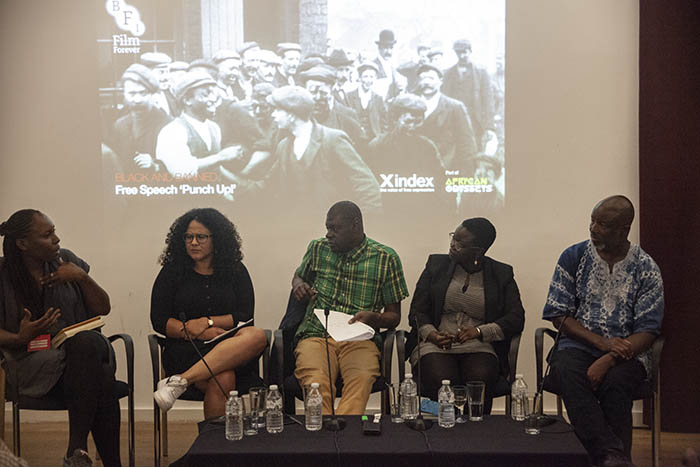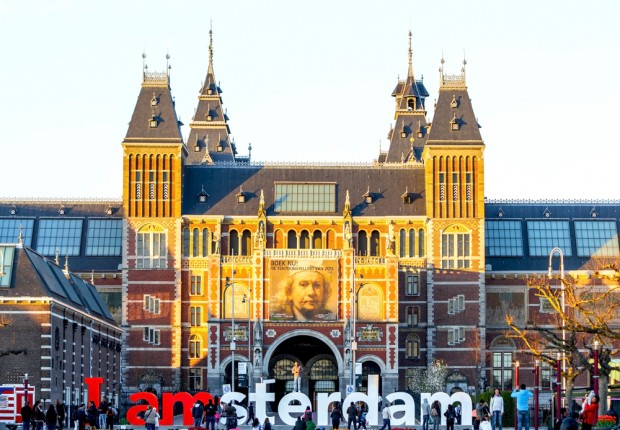Black and banned: Who is free speech for?
[vc_row][vc_column][vc_column_text]

From left to right: Dionne Walker, Elizabeth Pears, Kunle Olulode, Ethel Tambudzai, Toyin Agbetu. (Credit: Long Dang/Index on Censorship)
Is free speech a way to promote unheard and under-represented voices and perspectives, or is it a tool wielded by extremists and supremacists? So discussed a panel at the BFI Southbank on Thursday 6 September. Chaired by the director of Voice4Change Kunle Olulode, panellists included activist and filmmaker Toyin Agbetu, Buzzfeed News editor Elizabeth Pears, activist and charity director Ethel Tambudzai and filmmaker Dionne Walker.
The lively discussion covered topics ranging from the use of “the n-word”, what free speech means and drawing the line between free speech and abusive speech.
“I think free speech is such a complex issue,” Pears, the former news editor at The Voice, Britain’s only black newspaper, told the audience. “How do we balance free speech with someone’s human rights, someone’s rights to exist?”
Asked whether the repeated use of the “n-word” by musicians and artists can take the power away from it, Agbetu said: “It has a lot to do with commerce and little with desensitisation. Some commercial artists deploy it to make money. I’m not saying there’s not some conscious recognition [about its offensiveness], but they can’t take out the toxic element because it always has a toxic connotation.
“History is important, context is always important, but [as a British African] I’m always at the mercy ideologically and statistically of the ethnic majority,” he added. “If the ethnic majority says that the n-word is a cool word, [unlike myself, many] would continue to use it.”
On the topic of former foreign secretary Boris Johnson’s comments about Muslim women looking like ”letterboxes”, Pears said: “As a consequence…a kind of free pass has been given to the man on the street or woman on the street to repeat it in order to harm people. We’ve seen reports that islamophobic attacks went up. I don’t think you should use that platform to attack people.”
“This is what happens when you blur the line between what is taboo and what is sacred, what is free speech and what is abusive,” said Agbetu.
While everyone has access to free speech, Pears adds, not everyone has access to a platform. “Not all free speech comes at the same price, not all free speech has the same consequences,” she said.
Former vice president of Westminster University’s student union Ethel Tambudzai also spoke on hate speech and the idea of banning speakers in universities. “Regulations might be too heavy-handed, and depending on who’s making that regulation it becomes dangerous because who are we allowing to speak, or not to speak, and why?” she asked.
“Whatever happens in a university is also happening on the streets. We’re all silenced somehow. If you said everything you wanted to say all the time, I don’t think any of us have that privilege. Boris Johnson might more often, but I don’t think all of us do, and we have to think what does that look like and what does that mean.”
“The moment the government are controlling what academics are researching, studying, teaching and even allowed to think about in a classroom or how students express themselves, there are limits on where free speech becomes hate speech,” she added.
The visibility of minority communities was an issue for the panel. Walker, the director of the documentary film The Hard Stop, which focuses on the 2011 London riots, spoke about the importance of film in raising these voices in today’s society.
“[The film] covered such a controversial topic. It was a quite sensitive portrayal of stories of the black community. The idea of free speech comes in. It was quite important to tell a nuanced story. Oftentimes there’s a sense of being very black and white,” she said. “Argument becomes a kind of beaten over the head, you’re either for or against a particular motion. For Hard Stop we went for somewhere in the middle.”
The chair left the audience with a thought-provoking question: “Is free speech a way to promote unheard and underrepresented voices and perspectives, or is it a tool wielded by extremists and supremacists?”
Additional reporting by Long Dang. [/vc_column_text][/vc_column][/vc_row][vc_row][vc_column][vc_basic_grid post_type=”post” max_items=”4″ element_width=”6″ grid_id=”vc_gid:1536747948713-02464451-bc02-0″ taxonomies=”12953, 518, 6840″][/vc_column][/vc_row]

